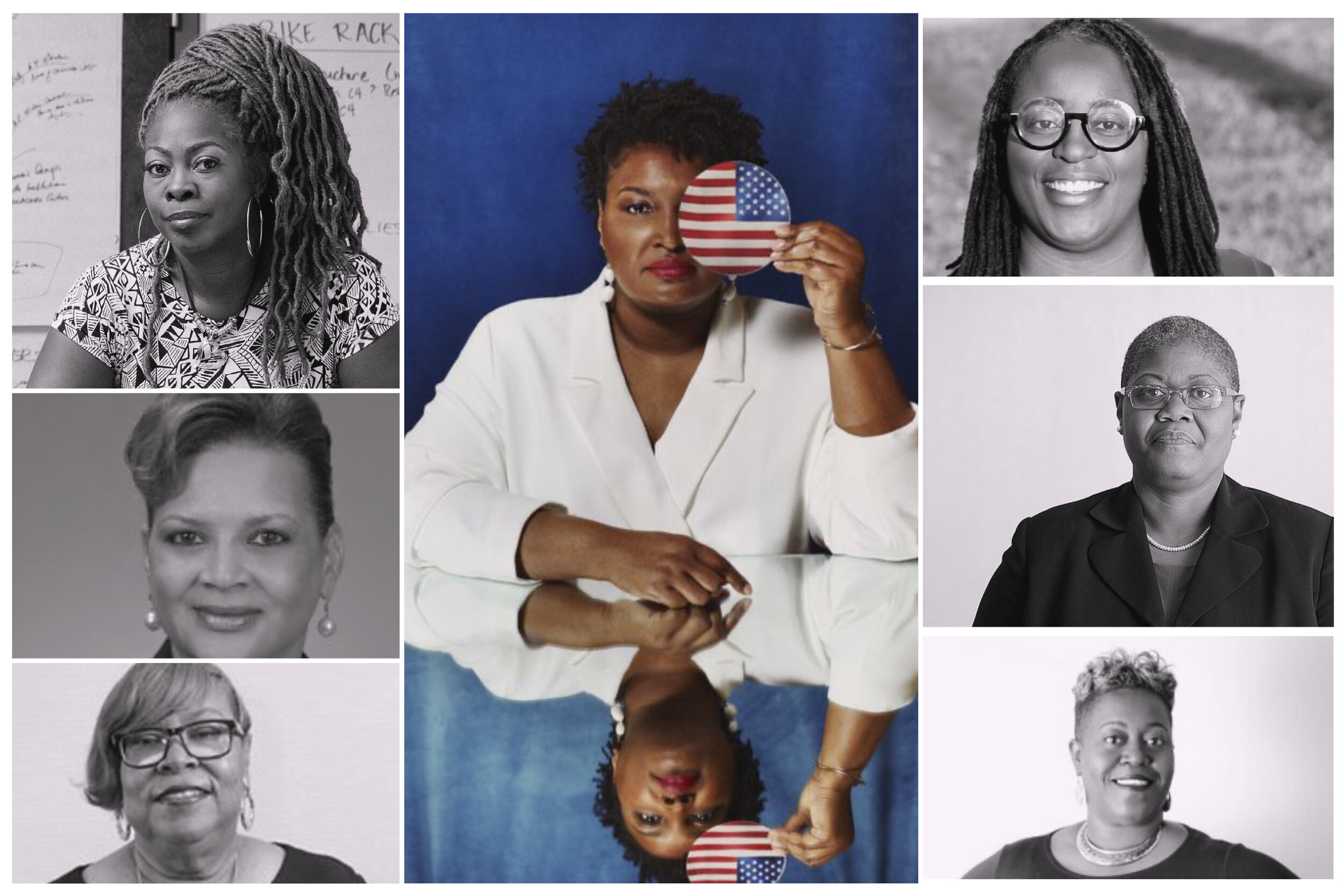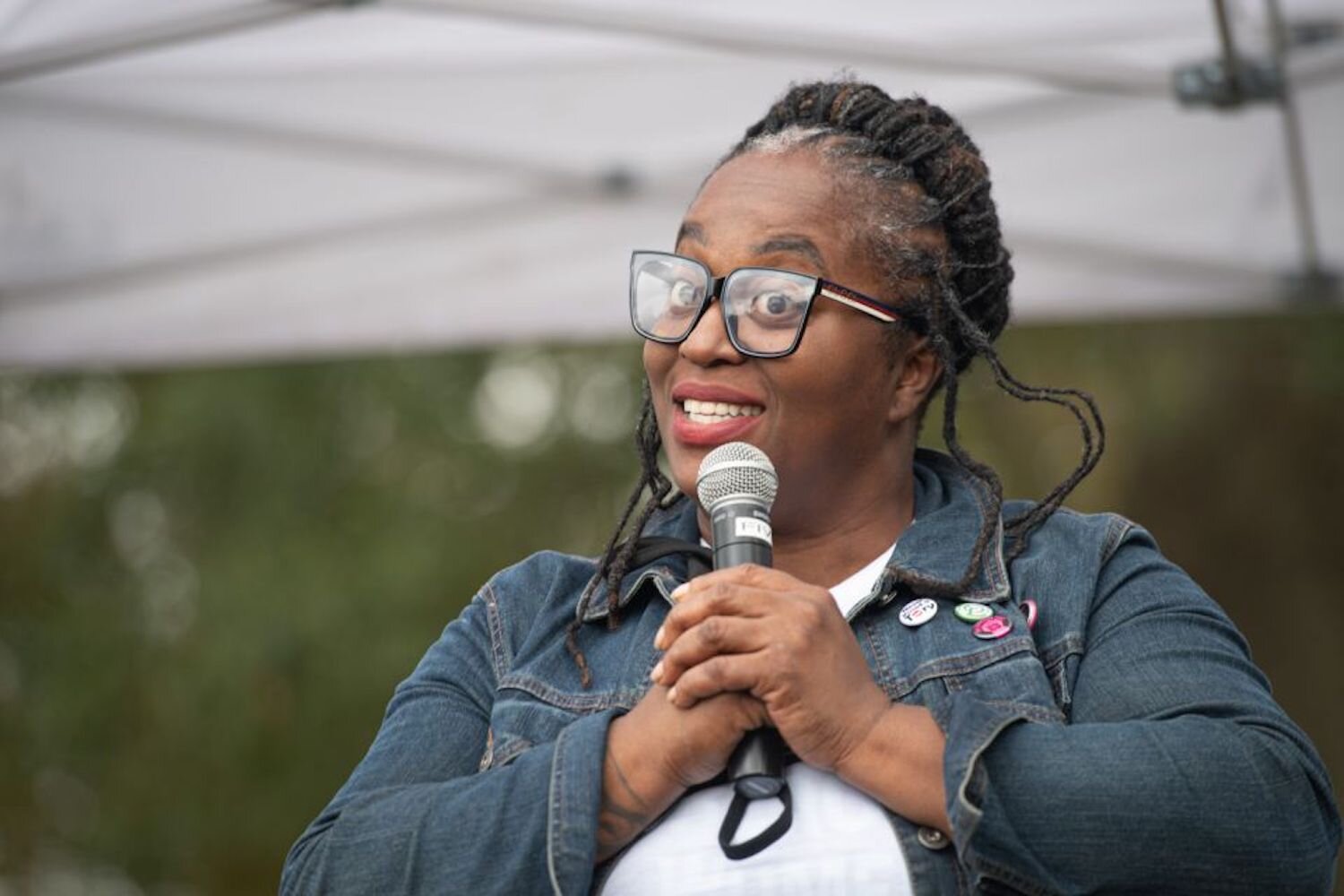Meet The Black Women Who turned Georgia Blue
Yep, it was Stacey. But don’t forget about Nsé, Helen, Tamieka, Melanie, LaTosha and Deborah.
Clockwise from top left: LaTosha Brown, Stacey Abrams, Nsé Ufot, Melanie L. Campbell, Tamieka Atkins, Helen Butler, and Deborah Scott.
On Tuesday, Democrats won both Georgia runoff elections—and control of the U.S. Senate. Democrat Raphael Warnock defeated Republican Sen. Kelly Loeffler 50.8 percent to 49.2 percent, and Democrat Jon Ossoff defeated Republican David Perdue 50.4 percent to 49.6 percent. This was a huge win for Democrats, and a significant shift for the long-red state of Georgia, which showed it’s blue hue for the first time in November.
Why did a Deep South state like Georgia finally go blue, while others that pollsters predicted to flip stayed solidly red? Although much of the media has rightfully praised Stacey Abrams and the organizations she founded—Fair Fight Action, which advocates against voter suppression; New Georgia Project, which helped registered over a million new voters in just over 3 years; and Fair Count, which seeks to get communities of color, rural populations and other marginalized groups counted in the 2020 Census—for playing a crucial role in helping flip Georgia this election, she didn't do it alone. Let’s meet (and support!) the squad that worked alongside her.
Executive Director of the New Georgia Project Nse Ufot speaks on stage during the "Count Every Vote" message in the wake of the presidential election results at Freedom Park on November 07, 2020 in Atlanta, Georgia. (Photo by Marcus Ingram/Getty Images for MoveOn)
In the run-up to the 2020 presidential election, the New Georgia Project sent over 1.2 million text messages, made 2.2 million phone calls and knocked on over 370,000 doors to motivate voters to register to vote and get to the polls. And while Abrams founded the organization, it’s run by Nsé Ufot, who is the executive director of both the New Georgia Project and its political arm, the New Georgia Project Action Fund. Ufot emigrated from Nigeria to Atlanta as a kid, graduated from the Georgia Institute of Technology and University of Dayton Law School and was previously an executive at Canada's largest faculty union and a lobbyist for the American Association of University Professors. And she has been working HARD.
“The balance of power in the Senate literally rests in the hands of Georgia voters,” Ufot recently told Yahoo Finance. “We're excited to have conversations with Georgians about how they leverage this power that they have in this moment. I think that never before have Georgians mattered more to, you know, our democracy….Elections are compression points for us. They're opportunities for us to test the power that we're building and an opportunity to bring about the change that we seek, to elect champions or people who will co-govern with communities to bring about the changes that we seek.”
Melanie L. Campbell, president of The National Coalition on Black Participation (NCBCP) and Black Women’s Roundtable, center, speaking at a news conference for the BWR Summit, in Washington DC on March 15, 2018. (AP Photo / Cheriss May)
Another Black female leader to whom we all owe a massive debt of gratitude is Melanie Campbell of The National Coalition on Black Participation (NCBCP), which has been vigilant in helping citizens vote with minimal barriers this election. Campbell is president of the nonpartisan NCBCP and convener of the Black Women’s Roundtable, a program centered on harnessing black women’s voting power to influence policy around the issues that matter most to them. Campbell has worked for more than a decade on voter enfranchisement, community engagement, and voter registration and is recognized as one of the hardest working servant leaders in today’s Civil Rights, Women’s Rights and Social Justice Movement.
Campbell and the NCBCP work closely with the Georgia Coalition for The Peoples’ Agenda, which is run by another game-changing Black woman, executive director Helen Butler. The People’s Agenda helped lead election protection in Georgia, and works to improve the quality of governance in Georgia, help create a more informed and active electorate, and have responsive and accountable elected officials. She is especially concerned with justice reform and protecting voting rights.
Then there is Tamieka Atkins of Pro Georgia, ProGeorgia is Georgia’s state based non-partisan voter engagement advocacy organization—they do the work to increase the vote share of historically underrepresented and socially responsible voters in Georgia, and provide member groups with critical tools, resources, and services to enhance and improve their voter contact work. She’s also at the head of The Women of Color Initiative, which supports women of color in policy-making and leadership positions to strengthen all of Georgia. We strive to support the self-determination and leadership of women of color in their development of statewide policy agendas.
LaTosha Brown. Image via Harvard.
LaTosha Brown is a co-creator of the Black Voters Matter Fund, an electoral organizing group that keys in on voter registration, policy advocacy, and organizational development and training. Their hands-on programs, like a Warrant Clinic that helps people clear warrants and fines they can’t afford and lifts barrier to employment, housing, and voting at the most fundamental level.
And let’s not forget Deborah Scott of Georgia STAND-UP, which played a massive role in educating voters and getting them registered to vote in this historic election. Georgia STAND-UP is an alliance of community, labor, and faith organizations that promote economic justice and smart growth strategies through research, education, and advocacy.
And of course, there is Stacey. If you haven’t watched her new film or read her book, there is no better time. She has truly dedicated herself to winning—not her own personal political victories, but winning the elevation of the voice and will of the people.
“When I ran for governor, I did not run simply for me. We went around this state to all 159 counties, and everywhere we went we talked about the power of people to make a choice,” Abrams tells the crowd. “On November 6th, when malfeasance and incompetence and my opponent who was a cartoon villain stole the voices of Georgians when he purged 1.4 million voters and oversaw the shutdown of 214 precincts that left 50,000 to 60,000 people without the ability to vote, when Georgia had the longest lines in the nation and the highest rejection rates of absentee ballots and provisional ballots,” Abrams continues, “It was not just about me. He was doing that to Georgians,” Abrams told the Washington Post back in May. “And the thing is, if I had fought back and said, ‘I am going to contest this election and make myself governor,’ then everyone who loved me and stood with me would have thought, ‘Well, this is about her fight.’ My responsibility was instead to focus on the right to vote and not my right to be governor. I had no right to be governor, but I have an obligation to do the work that I said I would do if I were governor.”
"We knocked on doors in pockets of communities that had never been touched. And we kept coming back," Abrams told CBS News national correspondent Mark Strassmann. "Is there anyone else in your family who needs to register? What about your neighbors?"




